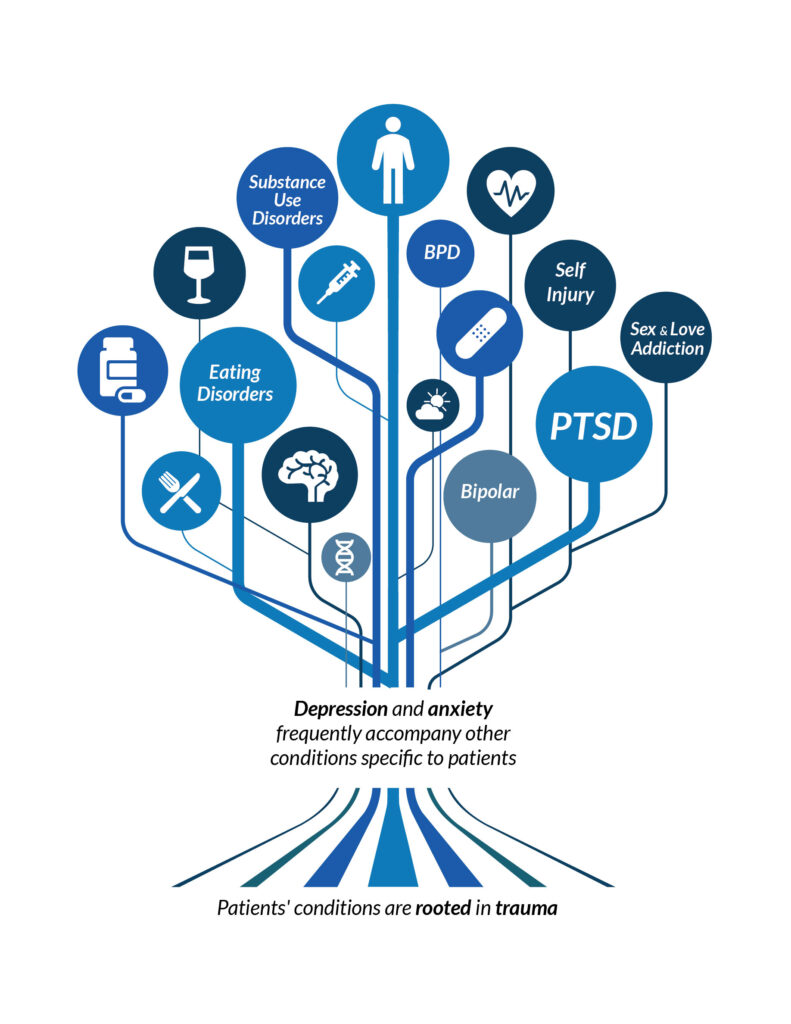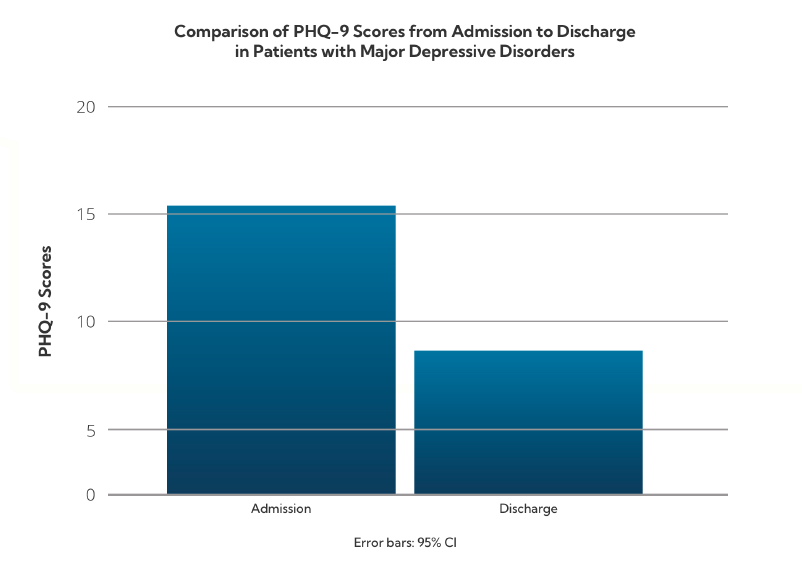Losing A Loved One, Getting Fired From A Job, Going Through A Divorce, & Other Difficult Situations Can Lead A Person To Feel Sad, Lonely, And Scared. These Feelings Are Normal Reactions To Life’s Stressors.
Most people feel low and sad at times. However, in the case of individuals who are diagnosed with depression or persistent depressive disorder, the manifestations of the low mood are much more severe and tend to persist, and the help of a depression treatment center may be necessary.
In 2024, of the 559 patients admitted to our programs, 73% of patients had a diagnosis of depression.
Video: Mood Disorders Are Often Manifestations of Trauma
Dr. Marcia Nickow, PSY.D., CADC, CGP, Clinical Director and Organizational Advisor at SunCloud Health on how mood disorders are often manifestations of trauma.
Signs and Symptoms of Depression
You may be wondering, how is depression diagnosed? Or, how can you quickly identify depression, as opposed to sadness or a passing feeling of the blues? – and when should you consider depression treatment instead of waiting for symptoms to pass?
To help you recognize depression that warrants concern, whether in yourself or a loved one, here are important symptoms of depression and/or depressive episodes — some of which you might even find surprising — that you shouldn’t ignore:
Trouble Sleeping
Despite being slower in demeanor and motivation, depressed people often lie awake at night, unable to sleep due to trouble sleeping. They may also find it difficult to get out of bed and may sleep for long periods during the day.
Overly Sensitive
In some, depression manifests as more irritability and impatience than feeling down. Tolerance for mild irritations becomes diminished due to a rise in unhealthy emotions and a lack of proper coping skills.
Loss of Interest in Activities One Used to Enjoy
Some people turn to hobbies they enjoy when they feel blue, but people with major depression tend to avoid them.
Suicidal Thoughts
Depression can be a fatal disease. Recurrent thoughts of death, especially suicide, plague about 60 percent of depressed people, and approximately 15 percent commit suicide. Women attempt suicide more often than men, but men succeed nearly twice as often.
Ironically, when depressed people have made a decision to do something drastic, such as killing themselves, they may go from lackadaisical and slowed to more energetic. That’s because they feel a sense of relief in having come to a resolution. If you notice a drastic switch like this or suspect a loved one is experiencing severe negative thoughts, or even suicidal thoughts, you should be concerned.
An Emerging Dark Side
A severely depressed person may become preoccupied with death and other morose topics, may also become more likely to take uncalculated risk or exhibit a regardless regard for their safety and wellbeing.
Change in Appetite
Some people overeat when they’re depressed or anxious, but in people with severe depression, the opposite is usually true. A depressed person may stop eating because he or she is no longer concerned with physical well-being.
We’re here to help you heal. Call now.
Help is one click or call away.
Types Of Depression
There are different types of depressive disorders, and while there are many similarities among them, each depressive disorder has its own unique set of symptoms.
Depression is the leading cause of disability in the United States among people ages 15 and 44. The most commonly diagnosed form of depression is Major Depressive Disorder. In 2015, around 16.1 million adults aged 18 years or older in the U.S. had experienced at least one major depressive episode in the last year, which represented 6.7 percent of all American adults.

Major depression is characterized by at least five of the diagnostic symptoms, of which at least one of the symptoms is either an overwhelming feeling of sadness or a loss of interest and pleasure in most usual activities. The other symptoms that are associated with major depression include decrease or increase in appetite, insomnia or hypersomnia, psychomotor agitation or retardation, constant fatigue, feelings of worthlessness or excessive and inappropriate guilt, recurrent thoughts of death and suicidal ideation with or without specific plans for committing suicide, and cognitive difficulties, such as, diminished ability to think, concentrate and take decisions. The symptoms of depression persist for two weeks or longer and represent a significant change from previous functioning. Social, occupational, educational, or other important functioning is also impacted. For instance, the person may start missing work or school, or stop going to classes or their usual social activities.
Some medical conditions can trigger depressive symptoms in individuals. This is called depressive disorder due to another medical condition. Endocrine and reproductive system disorders are commonly associated with depressive symptoms. For example, people with low levels of the thyroid hormone (hypothyroidism) often experience fatigue, weight gain, irritability, memory loss, and low mood. When the hypothyroidism is treated it usually reduces the depression. Cushing’s syndrome is another hormonal disorder caused by high levels of the hormone cortisol which can also cause depressive symptoms. Other conditions that have been found to cause depression include conditions such as HIV/AIDS, diabetes, strokes, Parkinson’s disease etc.
Another type of depression is related to changes in the length of days or seasonality. This type of depression is commonly referred to as Seasonal Affective Disorder (SAD). People with Seasonal Affective Disorder (SAD) experience similar symptoms but only during a specific time of year, usually winter. This appears to be related to the shorter days of winter and the lack of sunlight in many parts of the country. Phototherapy, or Light Boxes, have been found to be extremely helpful during these months.
Video: What Is Major Depressive Disorder MDD in Adolescents?
Dr. Alexander Chevalier, Medical Director, Child and Adolescent Psychiatry at SunCloud Health, gives parents helpful advice on what to look for when considering treatment centers their child.
Video: What Are the Symptoms of Major Depressive Disorder?
Alexander Chevalier, MD, Medical Director, Child and Adolescent Psychiatry at SunCloud Health discusses the symptoms of Major Depressive Disorder symptoms.
Depression And Anxiety Disorders:
Not the Same
Depression and anxiety disorders are different, but people with a depressive disorder often experience depression symptoms like those of an anxiety disorder, such as nervousness, irritability, and problems sleeping and concentrating. But each disorder has its own causes and its own emotional and behavioral symptoms.
Many people who develop depression have a history of an anxiety disorder earlier in life. There is no evidence one disorder causes the other, but there is clear evidence that many people suffer from both disorders.
Video: We Do Not Ignore the Co-Occurring at SunCloud Health
Dr. Kim Dennis, MD, CEDS, explains how SunCloud Health treats co-occurring disorders.
You don’t have to face this alone. Start today.
For yourself or someone you know.
Struggling With Depression?
We Will Help You Rebuild Your Life.
Depression can turn one’s life upside down as the disorder takes over, often leading to feelings of worthlessness and despair. But it doesn’t have to be this way. If you or someone you care about is in need of a depression treatment center, SunCloud Health is here to help.
Dr. Kim and her expert team at SunCloud Health have treated thousands of people with mood disorders. Our care team recognizes that no two individuals will need the same things. We develop a customized care plan designed to meet your unique needs. We have the tools and extensive experience needed to treat mood disorders with co-occurring issues. Most outpatient facilities aren’t prepared to provide this level of care. But thanks to the expertise of our team and the thoughtful design of our private care centers in Northbrook, Chicago, and Naperville, Illinois, we are ready to help you or your loved one take the first steps toward wellness.
We understand that you want an abundant life. Until now, this fulfilling life may have seemed far out of reach, stolen from you by the effects of your mood disorder. With proper care and time, that can change! We’ve seen it happen for thousands of others and we’re convinced it can happen for you.
From admit to discharge, we see an aggregate improvement in our adults as measured by the PHQ-9. Lower scores reflect an improvement.

Find hope and relief from depression. Reach out now.
Find effective treatment now.
What You Can Expect from SunCloud Health?
After you are admitted to one of SunCloud’s outpatient treatment programs, we surround you with a team to manage your comprehensive, individualized depression treatment plan.
Your team may include:
- A psychiatrist to oversee medications
- A primary treatment coordinator, often a licensed therapist
- A registered dietician
- A registered nurse practitioner
- A skilled family therapist
- A certified alcohol and drug counselor (CADC), if appropriate


Evidenced-Based Techniques at Our Depression Treatment Center
You can expect to take part in individual and group therapy as part of your depression treatment plan. As you progress, your care team will work closely with you to determine what’s working, what’s not working and make adjustments to foster your progress.
SunCloud’s depression treatment centers provide patients with a range of psychological treatments for mild depression, moderate depression, and severe depression, including:
- Expressive and experiential therapy, talk therapy
- Skills-based therapy such as DBT, ACT and CBT
- 12-step recovery programs and facilitation
- Education about the disease, its effects on you, your mind, your soul and your body
- Group sessions to teach and practice healthy interpersonal and relationship management
- Meal support and regular consultation with dietary staff as needed
- Regular psychiatric consultations and psychotherapy sessions
- Family therapy, including family participation if appropriate
- Yoga and body image therapy, when appropriate
- Therapies for treatment-resistant depression
- Transcranial Magnetic Stimulation (TMS Therapy), if appropriate
- SPRAVATO (esketamine) treatment, if appropriate
Life After Treatment of Depression?
As an outpatient and residential treatment center, SunCloud Health is in an ideal position to support you for as long as you agree our services are useful to you. With multiple levels of outpatient care provided by experienced mental health professionals skilled in treating depression, you may decide to stay connected through one of our aftercare outpatient groups – or you may want to continue seeing one of our individual therapists. We are here to provide continuous, caring support for your recovery journey.
Though we understand fully that you don’t want to spend your life in treatment from mild or moderate depression, we also know from experience that a lifetime commitment to wellness is the foundation of your well-being over the long term. We will work with you to relieve depression symptoms through personalized depression treatment and maintain a healthy outlook, which means achieving balance, honesty, and health — physical, emotional and spiritual. Our goal is to create a care plan that you can take with you forever, wherever you may go.
Find support, find peace. Start your journey today.
Help is one click or call away.
Living with depression and anxiety my entire life has been plain and simply just terrible. I have been on a merry go round of medication for decades and I have been diagnosed with just about every “mood disorder” out there. Often, I would turn to some form of self-destructive behavior as a way to deal with my pain and despair, and until recently I felt like this was just the way it was going to be forever. When I came to see Dr. Kim, I felt like I had met the “Dr. House” of Psychiatry (great TV series!). She actually spent countless hours in therapy with me and my family properly diagnosing me for the first time in my life and getting my medication finally on the right track. She is anything but a typical psychiatrist who spends maybe 10 minutes with patients and then runs out. The experience at SunCloud helped me see that, with ongoing support, I can actually live a normal and stable life.
SCH patient
Get Help Now
Thinking about seeking help or know someone who does? Click below to have one of our professional team members contact you.
Explaining SunCloud’s Integrated ModelWhy is an integrated treatment model essential to successfully treating patients?
Dr. Kim Dennis, Co-Founder and Medical Director at SunCloud Health, discusses the vital role the integrated model (that she is pioneering at SunCloud Health) plays in the success of treating patients with co-occurring disorders and underlying trauma. How does SunCloud create an authentic culture of patient support?
